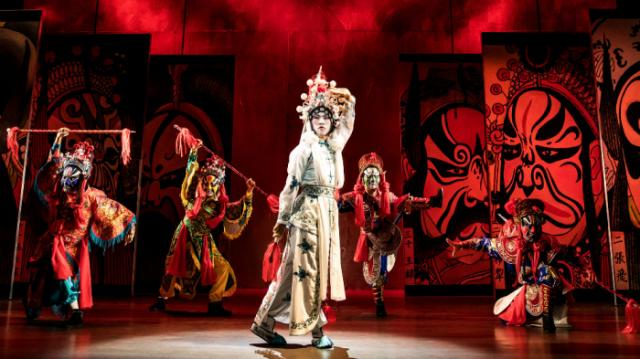
At Broadway's Cort Theater, David Henry Hwang’s M. Butterfly, an ambitious Tony-winner for Best Play in 1988, dramatizes life and the world by focusing on the conflicts of men versus women and the cultures of East versus West. Now in revival, text tweaks by Hwang and director Julie Taymor's unique theatricality have shifted the ambiance of the play. Almost 30 years ago, it was a provocative play to watch and intriguing to think about after the curtain went down. In this production, Hwang reveals more details and Taymor's staging is hit and miss. Still, M. Butterfly remains a balancing act between choosing fantasy or facing truth. Clive Owen as Rene Gallimard, a sad introvert, chooses fantasy. Gallimard is Hwang's fictionalized character inspired by a newspaper account about French civil servant, Bernard Bouriscot, convicted of espionage after his long-time affair with a Peking opera star who led him into spying. Like Bouriscot, Gallimard never realized that his paramour is actually a man posing as a woman. Importance of the sexual discrepancy fades with the spotlight focused on the fantasies and realities of the Eastern and Western cultures with a foundation on Italian opera, Madama Butterfly, and its male-female cultural dynamic. At the top of the play, in a Parisian jail cell, Gallimard thinks back over his life. As a young man he was never popular with the girls and the “least likely to be invited to a party.” For convenience, he married an older woman (Enid Graham), with no expectations of sexual excitement. When Gallimard was posted in China, Rene attended a production of Madama Butterfly and was tempted by its lotus blossom mystique and lead singer, Song Liling (Jin Ha). At that time, men played all the female roles so when he met Song, Gallimard assumed the singer was a man, but he quickly let Song convince him that she was really a woman posing as a man. They became lovers. Acculturated with an Western view of macho men and submissive women, Gallimard found in Song his "perfect woman," the woman in porno magazines, the exotic lover who knows how to pleasure a man while appearing submissive. As Song later admitted slyly, “Only a man knows how a woman is supposed to act.” The roles of East-West, male-female cultures blur, cross borders and rebuff each other and themselves. Gallimard often breaks the fourth wall and speaks directly to the audience. Clive Owens (Old Times), usually portrayed as more suave, adapts some loose physical postures to come across as insecure although the audience is well aware that Owens is a striking-looking actor. His deliver a secure and articulate performance although Gallimard is a difficult character to empathize with since he is not completely honest even at the end, when he demands to see proof of Song's manhood. Facing Song, Gallimard admits, "I'm a man who loved a woman created by a man." He does not, however, speak openly as a man loving another man. That he cannot admit. In this moment, Owens is compelling in his misery. Jin Ha is not the most alluring woman but a persuasive actor. As Song, she spots her mark, Gallimard, and plays him beautifully although their charisma is questionable. There is more to the backstory of Song Liling, but we don't get it here. Other characters include Murray Bartlett Gallimard's friend, Marc, a self-assured ladies' man, always urging Gallimard to be more outgoing, especially with women. Celeste Den plays Comrade Chin, a demonic party worker during the Cultural Revolution. Michael Countryman is a no-nonsense French Ambassador and Enid Graham, without much to do in the show, is understandably furious when she hears about her husband's affair and leaves Rene Gallimard. Julie Taymor's directions are imaginative, but attention is focused on Paul Steinberg's sizable sliding panels that look more cartoonish than theatrical and Ma Cong's dance sequences, that are impressively acrobatic and acceptably balletic. Constance Hoffman's costumes, Stephen Kaplan's mask and puppet designs stand out, as does lighting by Donald Holder. Interesting are the music shifts from the Western Madama Butterfly to Elliot Goldenthal's original music for both the Cultural Revolution scenes and “The Butterfly Lovers,: an Asian interpretation of the Puccini opera. A sad, tender story, the secret of M. Butterfly lies in a suspension of belief, letting Gallimard draw you unconditionally into his passionate affaire de coeur. Clive Owen gives a skilled performance as the complex man who chooses fantasy but Huang's rewriting and Taymor's staging deviate from the fine-spun illusion of mystery and culture.
